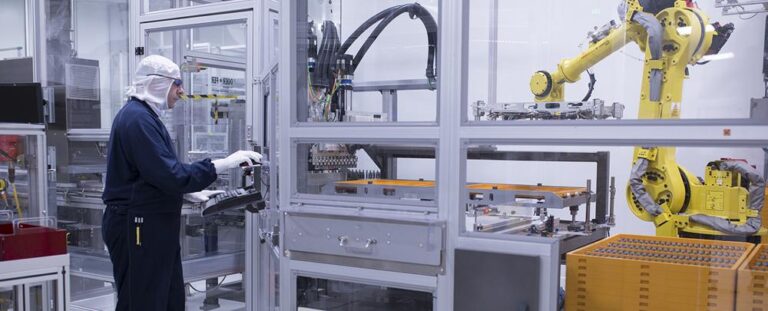Eli Lilly to Invest $5.9 Billion in Expanding Pharmaceutical Manufacturing in Houston
Eli Lilly, a prominent leader in the U.S. pharmaceutical industry, is preparing to inject a massive $5.9 billion into expanding its manufacturing footprint in Houston, Texas. This ambitious initiative aims to significantly enhance the company’s production capacity for critical medications, reinforcing Houston’s emerging status as a key biotech and pharmaceutical hub. The expansion is projected to create more than 3,000 direct employment opportunities, alongside thousands of indirect jobs, providing a substantial boost to the local economy. To support this venture, Eli Lilly is actively negotiating with state and local officials to secure tax incentives that will help offset development costs and accelerate project implementation.
The expansion plan encompasses several strategic priorities:
- Development of cutting-edge manufacturing plants equipped with the latest technology
- Investment in innovative production methods to optimize efficiency and output
- Emphasis on biologics and injectable drug manufacturing, reflecting market demand
- Commitment to sustainable practices to minimize environmental impact
Below is an overview of the anticipated project milestones and impacts:
| Aspect | Projection |
|---|---|
| Total Investment | $5.9 Billion |
| Job Creation | 3,000+ new positions |
| Construction Timeline | Approximately 4 years |
| Operational Launch | Expected by 2028 |
Economic and Industrial Impact of Eli Lilly’s Houston Expansion
The planned $5.9 billion investment by Eli Lilly is poised to act as a powerful economic engine for Houston, reshaping the region’s industrial landscape and labor market. This capital infusion will not only enhance pharmaceutical manufacturing capabilities but also stimulate innovation and reinforce Houston’s competitive edge in the biotech sector. The initiative aligns with a national push to strengthen domestic pharmaceutical production, reducing reliance on international supply chains and enhancing resilience amid global disruptions.
Anticipated economic advantages include:
- Creation of thousands of skilled manufacturing and engineering roles
- Increased economic activity through local procurement and service demand
- Higher tax revenues stemming from expanded industrial operations
- Elevated stature of Houston as a pharmaceutical manufacturing powerhouse
| Investment Phase | Expected Results | Timeline |
|---|---|---|
| Facility Construction | Approximately 2,500 construction jobs and local contracts | 2024-2026 |
| Equipment Installation | Deployment of advanced manufacturing technologies | 2025-2027 |
| Operational Staffing | 3,500+ permanent jobs in manufacturing and support | 2027 and beyond |
Overview of Tax Incentives Requested by Eli Lilly for Houston Facility
To facilitate its $5.9 billion manufacturing expansion, Eli Lilly has formally applied for a comprehensive suite of tax incentives from Texas authorities. The company is seeking property tax abatements, sales tax exemptions on construction materials and equipment, as well as payroll tax credits linked to job creation targets. These incentives are designed to alleviate upfront capital expenditures and operational costs, making the project financially viable while promising significant economic returns for the region. Eli Lilly projects the creation of over 2,000 permanent jobs as part of this development, underscoring the mutual benefits of the tax relief.
The incentive package is structured with performance-based milestones tied to employment and investment levels. Texas economic development officials emphasize that this proposal leverages the state’s favorable business environment and skilled workforce to attract high-value manufacturing projects. The table below summarizes the key tax incentives sought:
| Incentive Type | Purpose | Estimated Value |
|---|---|---|
| Property Tax Abatement | Reduction in property taxes during construction and early operations | Approximately $150 million over 10 years |
| Sales Tax Exemptions | Exemptions on purchases of construction materials and manufacturing equipment | Estimated $85 million |
| Payroll Tax Credits | Credits awarded based on job creation benchmarks | Up to $75 million over 5 years |
Strategies for Local Leaders to Maximize Benefits from Eli Lilly’s Investment
To fully capitalize on Eli Lilly’s substantial investment, local government officials and community stakeholders should foster an ecosystem that promotes innovation and sustainable growth. Strengthening collaboration between public agencies and private enterprises will be critical to developing a workforce equipped with the skills required by Eli Lilly and other biotech firms. This can be achieved through enhanced STEM education, vocational training programs, and partnerships with Houston’s universities and technical colleges.
- Accelerate regulatory approvals to streamline project development and attract further investments.
- Invest in infrastructure upgrades including transportation networks, utilities, and broadband connectivity to support industrial growth.
- Promote integration of local suppliers to maximize economic benefits within the Houston community.
| Recommended Action | Projected Outcome |
|---|---|
| Expand STEM-focused education initiatives | Robust pipeline of skilled workers for the future |
| Enhance public-private partnerships | Increased innovation and investment opportunities |
| Offer targeted tax incentives | Attraction of complementary industries and suppliers |
Additionally, maintaining transparent and ongoing communication with Houston residents will foster community support and ensure the project’s long-term success. By positioning Houston as a premier destination for pharmaceutical manufacturing, local leaders can secure both immediate economic gains and sustained competitiveness in attracting future high-tech investments.
Summary
Eli Lilly’s planned $5.9 billion expansion of its pharmaceutical manufacturing operations in Houston represents a transformative opportunity for the region’s economy and industrial landscape. With the potential to create thousands of jobs and enhance Houston’s role as a biotech manufacturing hub, the project is a key milestone in strengthening domestic pharmaceutical production. As negotiations over tax incentives continue, stakeholders will be closely monitoring the development’s progress and its broader implications for Houston’s economic future.

